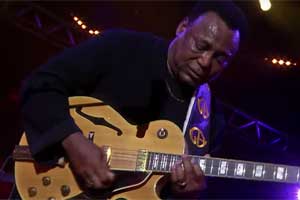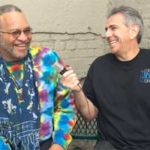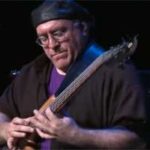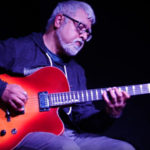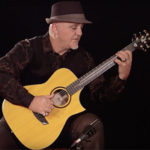Jazz guitar icon reflects on his long career, including 40 years of his biggest album
By Gary Graff
Aug. 26, 2016
If George Benson’s isn’t the first name mentioned when someone brings up great jazz guitarists, you can bet it’s right up there. A prodigy who picked up the ukulele when he was seven years old in his native Pittsburgh and released his first single, “She Makes Me Mad,” when he was 10, Benson has arguably done more to bring jazz to the masses than most and maybe any of his colleagues. A run that began with the triple-platinum “Breezin’,” celebrating its 40th anniversary this year, put Benson on the pop charts with “This Masquerade” and subsequent singles such as “The Greatest Love Of All,” “On Broadway,” “Give Me The Night” and “Love The Hurt Away” with Aretha Franklin. He’s also logged sideman duties with Brother Jack McDuff, Miles Davis, Larry Young, Jimmy Smith, Freddie Hubbard, Hubert Laws and many more and has won 10 Grammy Awards along the way. These days Benson is still active, both live and in the studio, and he’s in the midst of plotting his next recording project as well as eyeballing a potential film biopic. He says he’s been “trying to retire for 20 years, but they won’t let me.” And we’re happy for that.
FGPO: How did you get started playing guitar?
Benson: When my stepfather met my mother, I was seven years old. Before that I didn’t live in a house with electricity. When we moved into a house that did have electricity, he went to a pawn shop and got his electric guitar out and plugged it in, and I couldn’t believe the sound that went through that wire to a box on the other side of the room and made loud sounds. I was fascinated from the very beginning. He heard me messing with his guitar one day and said: “Now you got to learn how to play it” and started teaching me.
FGPO: You actually started on ukulele, right?
Benson: That’s right. He realized my hands weren’t large enough to play guitar, so he found a ukulele in a garbage can, all smashed to pieces. He glued it back together, put some strings it and taught me the first few chords. I made a fortune with that ukulele playing on street corners.
FGPO: You could’ve started a fund for your first proper guitar.
Benson: [laughs] Yeah, right. To a seven-year-old, money don’t mean anything after you buy your first hot dog and bag of popcorn. Friends who knew I had quarters and 50-cent pieces begged me out of a lot of it. One day my mother was waking me up for school and saw all this money spilling out from the pillow. “Where’d you get all this money?” I made more money in a day on the street corner than she did in two weeks at the hospital.
FGPO: Did you always approach the guitar as a kind of universalist, both in what you played and the way that you played it?
Benson: I think so. I stopped kind of forcing myself into any particular way of thinking. I realized people come in all sorts, all sizes, all flavors, all listening desires. Once I found out my audience was diversified, I realized my versatility was actually a credit. It was something critics used to ball bastardizing the music [laughs]. But if a guy’s got a girlfriend, and he’s a jazz man himself and the girlfriend likes pop or country, even, there better be something for her to listen to when she comes with him. You can’t force people to like what you like. So I found when I did a mixed set, a diversified set, the crowd enjoyed it much better.
FGPO: But your favorite style is…
Benson: Jazz, of course. That was the big challenge to play. I had to learn harmony and theory. I have to find out where jazz came from, where it’s at now, where it’s going. You can be one of those guys to point the direction to where it’s going next, if you do it right. That’s what makes it exciting.
FGPO: For somebody who likes to go against the grain, though, did you find it hard to work within a music that has some rigid expectations, if not necessarily “rules?”
Benson: Well, I’ve always felt that though there are rules, just based on harmony, but then the word “theory” comes into play. With that I just took things to the moon. I realized I had no real set parameters, and I said: “Man, what prevents me from going over here and doing this or that.” Then I found out—nothing. So I started trying things out, and I found a lot of it was well-accepted around the world by people, mostly people who are not critics.
FGPO: So you kind of indoctrinated yourself to please the audience more than anyone else?
Benson: That’s true. I envy [critics’] education and experience, but that’s not me. I just felt like you can pick what you [do] and use it the way you want and hope for the best. It’s like a fighter in the ring; he’s got a lot of things in his repertoire, and the one that works is the one that you see is having the best effect on your audience and your opponent. So I stay loose. I test my theories out, try new things, and the ones that stick I keep and the ones that work I leave out. Jazz does allow you to do that. No two nights are alike, so you don’t bore yourself to death. I can play the same songs 50 times and it never sounds the same, so that really makes it interesting for me, the artist.
FGPO: Your big break came with Brother Jack McDuff. What was that like?
Benson: I didn’t work with a lot of people before that. I left Pittsburgh when I was 19 years old. Jack McDuff heard me—and fired me the same day! [laughs] He thought he heard something. He heard me play the blues, but when he took me on the road and started playing jazz tunes, I didn’t know anything about jazz chord changes. He told me that night: “I don’t think you’re gonna be able to make it with this band, but when we get to New York I think I got a gig for you.” When we got to New York, his manager heard the band and said, “Jack, you can’t fire this kid.” “Why not?” “Your band sounds so much better than the last time.” He suggested we go into the studio, and it all worked out.
FGPO: What was your experience like with Miles Davis?
Benson: I only got to do the recordings with him. He was an exciting guy, quite different, almost fearful to be around, ’cause you didn’t know what he was going to do next. Everybody admired him and so did I. When he spoke, he passed out lessons; he used to say things I never imagined, never looked at from that point of view before. I never imagined Miles Davis would be seeing music from that point of view. Everybody became better musicians when they worked with him, because Miles did not bother them. He let them be themselves. He’d say: “Hey man, play what you feel. What do you feel when you play this song? I want you to play that.” One day Tony Williams was trying to tell me how to play, and Miles said: “Man, Tony, shut up. Play your drums, man. George, you play what you want to play, man.” Then he chased Tony to the other side of the studio and said: “Just set your drums up, man. You play too loud, anyway.” He was quite a guy. He taught me to really keep an open mind about things.
FGPO: What kept you from going on the road with Miles?
Benson: I found out he WAS trying to hire me in his band. My manager said, “George,” Miles is gonna call you to ask you to join his band, but you can’t do it.” I was like, “Are you crazy?! This is Miles Davis, the baddest cat in the world!” “But George, everybody thinks you’re gonna be bigger than Miles.” “Man, what planet are they from? You don’t get bigger than Miles…” But true enough, the records blew up. They went to the moon. I did a lot of shows with Miles. Some times he opened for us. But I do regret I didn’t get a chance to work with him like that. I know I would’ve been a better musician, just like all the other cats who worked with him.
FGPO: It’s 40 years this year since Breezin’ came out. What’s your 2016 perspective on that album?
Benson: It’s hard to believe what it accomplished. It changed the world—starting with me. It turned me into somebody important. Where critics used to chop me up, and had plenty to chop up, people were so into that record that it made the critics look like they didn’t know what they were talking about. The critics were always like, “He can’t do this, he can’t do that,” and people were like, “What George Benson are you talking about?” And by winning at the Grammy Awards, everything changed. People started calling us from all points of the world. Then right after that “The Greatest Love Of All” came out a year later, and then next year something altogether different happened with “On Broadway,” which had nothing to do with “The Greatest Love Of All” or “This Masquerade.”
FGPO: How did you come up with that particular arrangement of “On Broadway?”
Benson: The producer [Tommy LiPuma] asked me if I knew that song. I said, “Yeah, I know it. What about it? I hope you’re not asking me to record it. I don’t want to destroy that classic, man.” But he said, “I think people would love to hear your version of it,” so I said, “Let me live with it for awhile.” Around the same time, I was talking to Quincy Jones about getting together and recording something. He mentioned that yesterday’s music was based on one bar, what he called a one-bar phrase. That’s what the original version of “On Broadway” was; it repeated the same thing every bar. Then he said, “But today’s music is a two-bar phrase.” I had no idea what he was talking about until I started listening to the radio and I realized all the popular songs had two-bar phrases. So I took [“On Broadway”] and added a second bar, which made it half as boring for me ’cause the one-bar phrase wore me out. But the two-bar phrase made it something to look forward to, the second bar, and it made it different enough to feel like my version of it. That’s how it is, man; I just kind of learn as I go [laughs].
